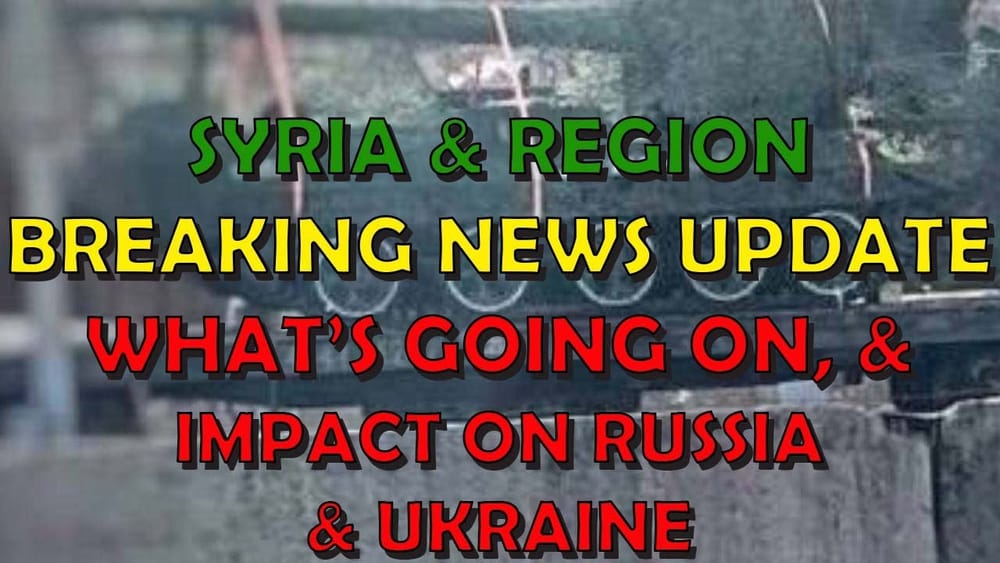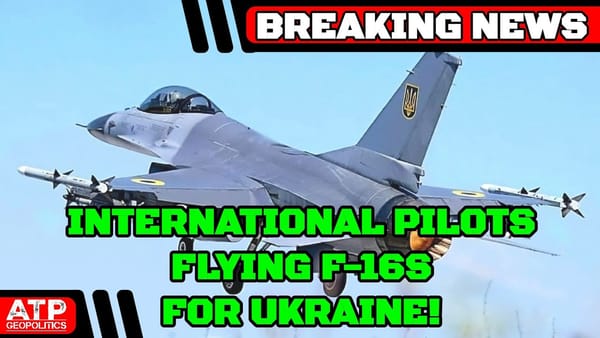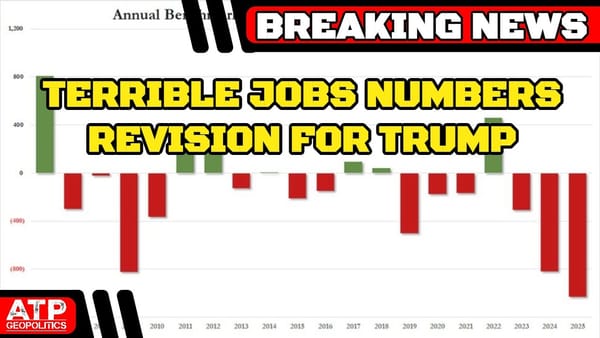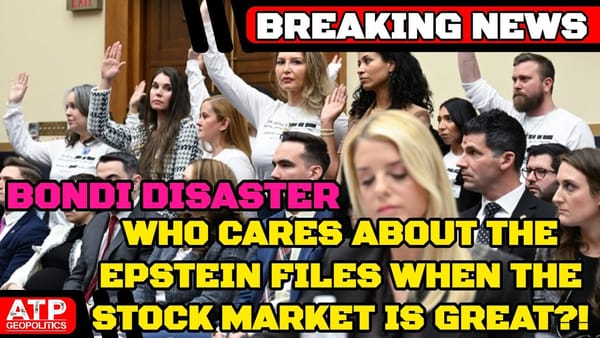Syria BREAKING NEWS: Syrian Update & Impact on Russia and Ukraine
Table of Contents 📖
"There won't be World War Three. There will be true realities on the ground, which show that Russian red lines never really existed, only in the heads of weak people."
Hello Team
🎦 00:00-00:06⏩
Jonathan introduces the video, stating that it will be a geopolitics breaking news update on Syria and its implications for Russia and Ukraine.
Return to top⤴️
Overview of the developing situation in Syria
🎦 00:07-00:51⏩
Jonathan explains that the video will provide an overview of the situation in Syria based on the news he has aggregated. He cautions viewers that if they want in-depth reporting, they should refer to mainstream media. He highlights that Syria has fallen to rebel factions, some supported by the US and Turkey, and others that are Islamic jihadists. He mentions that the HTS group has been particularly active recently, led by a figure who has become more "pluralist and reformist".
Return to top⤴️
Prevailing sentiment among the Syrian people
🎦 00:51-01:39⏩
Jonathan states that many Syrians believe the rebel factions, despite being unsavoury, are better than the Bashar al-Assad regime, a Ba'athist dynasty that has been particularly brutal since Russia's military involvement in 2015. He notes that Russia initially referred to the rebels as "terrorists" but has recently started calling them the "Syrian opposition" as their position weakens.
Return to top⤴️
Reports of Israeli airstrikes in Daraa province
🎦 01:39-01:57⏩
Jonathan reports several airstrikes in the Daraa province, reportedly by the Israeli Air Force. This suggests Israeli involvement and concern over the evolving situation.
Return to top⤴️
Israeli airstrikes on air base outside Damascus
🎦 01:57-02:40⏩
Jonathan reports that an air base outside Damascus was struck by Israeli fighter jets, possibly to destroy equipment, including chemical warfare and other military equipment, before it could fall into rebel hands. This indicates Israel's concern about the potential consequences of the regime change.
Return to top⤴️
Concerns and interests of various international actors
🎦 02:40-03:56⏩
Jonathan discusses the interests of various international actors in Syria:
- Israel: Concerned about Iran's influence and arms supply to Hezbollah through Syria. They likely see the weakening of the Assad regime as positive for their security.
- Turkey: Expected to play a key role in Syria's future, potentially acting as a "kingmaker."
- US: Has a vested interest, although its internal political situation may complicate its involvement.
- EU: Interested in stability due to Syria's proximity and the impact on migration.
Jonathan emphasizes Syria's strategic importance as a "linchpin" connecting various regional actors and interests.
Return to top⤴️
Impact on Iranian missile development
🎦 03:56-04:45⏩
Jonathan discusses reports of Israel targeting a research centre in Damascus believed to be involved in developing Iranian missiles. He suggests that this could benefit Ukraine, as it might prevent these missiles from being sent to Russia for use in the war.
Return to top⤴️
Rebel forces enter Latakia and Tartus
🎦 04:45-05:57⏩
Jonathan reports that rebel forces have entered Latakia and Tartus, also controlling the Kosovo border crossing into Turkey. The status of the Khmeimim air base and the port of Tartus, which have hosted Russian forces, is uncertain.
Return to top⤴️
German journalist reports on Russian Foreign Ministry's statement
🎦 05:57-06:44⏩
Jonathan cites a German journalist in Russia, Ina Rook, who reports that the Russian Foreign Ministry claims to have accepted Assad's fall and expressed a desire to maintain its bases in Syria. Jonathan finds this claim highly unlikely, given the rebels' history of conflict with Russia.
Return to top⤴️
Russian military blogger reports on surrounded Russian soldiers
🎦 06:44-07:38⏩
Russian military blogger Razvedos reports that groups of Russian soldiers are surrounded in Syria with no escape route. The blogger expresses hope for a political solution but acknowledges the dire situation.
Return to top⤴️
Kurdish forces blockading Russian military facilities
🎦 07:38-08:14⏩
Jonathan mentions a report from Rebar stating that Kurdish forces have begun blocking Russian military facilities in the Trans-Euphrates region, including positions at the oil refinery in the Homs desert. The report suggests that Russia's presence in Syria is being eliminated.
Return to top⤴️
Russian source Rebar's analysis of the situation
🎦 08:14-09:51⏩
Jonathan quotes extensively from Rebar, a pro-Kremlin source, which offers a grim assessment of Russia's position in Syria:
- Russia's military presence in the Middle East is "hanging by a thread."
- Kurdish formations are blocking Russian forces.
- The Khmeimim base is cut off, and Russian ships have been withdrawn from Tartus.
- Russian positions at the Homs oil refinery are blocked.
- Rebar criticizes the Russian military leadership for its lack of initiative and inaction on the ground.
Footage of destroyed Pantsir S1 air defence system near Damascus
🎦 09:51-10:18⏩
Jonathan describes footage showing a destroyed Pantsir S1 air defence system near Damascus, highlighting the loss of Russian-supplied equipment.
Return to top⤴️
Remnants of Syrian Arab Army forces in Yurin
🎦 10:18-10:46⏩
Jonathan reports on remnants of the Syrian Arab Army (SAA) forces in Yurin, northern Syria, who have laid down their weapons. Many have reportedly removed their uniforms, attempting to blend in or join the rebels.
Return to top⤴️
Impact on Syrian refugees and European migration
🎦 10:46-12:30⏩
Jonathan discusses the potential impact on Syrian refugees, particularly those in Europe. He recalls the use of images of Syrian refugees in the 2016 Brexit campaign and suggests that many refugees may now hope to return to their homeland. He emphasizes that refugees often prefer to live in their own countries and that the situation in Syria has been a significant factor in European migration.
Return to top⤴️
Rumours about Assad's plane being shot down
🎦 12:30-13:43⏩
Jonathan discusses rumours circulating about the possible shooting down of Assad's plane by a Russian S-300 air defence system as he was fleeing Syria. He mentions conflicting reports, including claims that Assad's plane may have landed in Abu Dhabi, the United Arab Emirates, or Moscow. Other reports suggest the plane may have crashed, but this remains unconfirmed.
Return to top⤴️
Ukrainian intelligence claims Assad plane crash reports are Russian disinformation
🎦 13:43-13:56⏩
Jonathan relays a report from Ukrainian intelligence suggesting that the reports of Assad's death in a plane crash are Russian disinformation. They claim that the loss of the plane's radar signal was likely due to actions by the crew following Russian instructions.
Return to top⤴️
Iranian tanker makes U-turn in Gulf of Suez
🎦 13:56-14:20⏩
Jonathan reports that the Iranian tanker Lotus, carrying 750,000 barrels of Iranian crude oil and heading for Syria, has made a U-turn in the Gulf of Suez. This illustrates the immediate impact of the events in Syria on regional actors and their behaviour.
Return to top⤴️
Assad's palace ransacked and footage of his family bunker
🎦 14:20-14:39⏩
Jonathan describes footage showing that Assad's palace has been ransacked. A video from the bunker under the palace of Assad's younger brother reportedly shows weapons, gold, a gold-bound Koran, and an armoured door leading to a vault.
Return to top⤴️
Footage of Assad's car fleet
🎦 14:39-15:59⏩
Jonathan describes footage of Assad's extensive car collection, including luxury vehicles and, bizarrely, some camper vans. He quips about the contrast between the luxury cars and the camper vans, humorously imagining Assad choosing between a Ferrari Testarossa and a camper van for a weekend trip during the civil war. He comments on the greed and narcissism of dictators.
Return to top⤴️
Weakening of Hezbollah and disruption of Iranian supply routes
🎦 15:59-17:41⏩
Jonathan quotes a source, Tandar, who raises the question of what will happen to Lebanon and Hezbollah following Assad's fall. Hezbollah, already weakened, is now cut off from Iran. Jonathan explains that Israel has played a role in weakening Hezbollah and disrupting Iranian supply routes through Syria, which has emboldened the Syrian rebel forces. He acknowledges the moral complexities of Israel's actions but emphasizes the strategic impact on Hezbollah and Iran's regional influence. Jonathan explains that a land route from Tehran to Beirut is no longer viable, and supplying Hezbollah by air or sea will be more difficult.
Return to top⤴️
Impact on Russia's access to the Mediterranean
🎦 17:41-19:43⏩
Jonathan quotes Jason Corcoran, who states that Assad's downfall has "shaken Putin." Jonathan explains that the loss of Tartus deprives Russia of a crucial warm-water port in the Mediterranean, similar to the importance of Sevastopol in Crimea. These ports are vital for Russia's access to the Mediterranean, the Atlantic, the Suez Canal, and the Indian Ocean, especially as many of Russia's other ports are frozen for parts of the year.
Return to top⤴️
Potential weakening of Russia's political standing
🎦 19:43-20:29⏩
Jonathan suggests that the events in Syria could politically weaken Russia. He believes that many in the Russian public and the military blogosphere may question the value of Russia's involvement in Syria. While some may understand the strategic importance of Tartus, others may see it as a fight against terrorism, and the loss could lead to disillusionment.
Return to top⤴️
Lithuanian Foreign Minister's statement on Russia's defeat
🎦 20:29-21:03⏩
Jonathan quotes Gabrielius Landsbergis, the former Foreign Minister for Lithuania, who states that the Syrian example shows that Russia can be "kicked out" and that the West is strong enough to win. Landsbergis emphasizes that the West should not fear Russia in Ukraine or elsewhere. Jonathan praises Landsbergis as a strong advocate for Ukraine and against Russia.
Return to top⤴️
Former General Ben Hodges on Russia's disregard for international law
🎦 21:03-21:32⏩
Jonathan cites former General Ben Hodges, who argues that Russia's disregard for international law should give pause to those advocating for negotiations with Ukraine. Hodges suggests that Russia will likely seek a deal with someone else to continue its "lucrative criminal activity" and that the loss of the naval base in Tartus could be a significant problem for the Kremlin.
Return to top⤴️
Disruption of Russian stolen grain transportation
🎦 21:32-21:59⏩
Jonathan reports that the transportation of stolen Ukrainian grain by Russia has been disrupted, with the Tartus-bound ship "Matros Pozynych" adrift west of Cyprus, awaiting instructions. This demonstrates a tangible impact on Russia's illicit activities.
Return to top⤴️
EU Foreign Policy Chief's statement on Assad's fall
🎦 21:59-22:45⏩
Jonathan quotes Kaya Kanis, the EU Foreign Policy Chief, who calls the fall of Assad's regime a "positive and long-awaited event" linked to the weakness of Russia and Iran. Kanis emphasizes the EU's commitment to regional security and its intention to work with partners to stabilize the region. Jonathan reiterates the EU's interest in Syrian stability due to its proximity and the impact on migration, particularly in countries like Germany.
Return to top⤴️
Luke Coffey on prioritizing the weakening of Moscow
🎦 22:45-23:52⏩
Jonathan quotes Luke Coffey, a senior fellow at the Hudson Institute, who argues that the events in Syria and the state of the Russian economy present a "rare window of opportunity" to weaken Moscow. Coffey asserts that every foreign policy decision in the coming months should prioritize this goal. Jonathan strongly agrees, emphasizing that now is the time to "turn the screw" on Russia.
Return to top⤴️
Jonathan's criticism of Trump's comments on aid to Ukraine
🎦 23:52-25:41⏩
Jonathan expresses his frustration with comments made by Donald Trump about reducing aid to Ukraine. He criticizes Trump's negotiating tactics, arguing that Trump is showing his cards too early and undermining Ukraine's position. Jonathan believes that the US should be threatening Russia with increased aid to Ukraine, not the other way around, in order to secure a better deal. He sees Trump's approach as helping Russia more than Ukraine.
Return to top⤴️
Ukrainian Foreign Minister's statement on Russia throwing Assad under the bus
🎦 25:41-26:36⏩
Jonathan quotes Dmytro Kuleba, the Foreign Minister of Ukraine, who states that Putin has "thrown Assad under the bus" to prolong the war in Ukraine. Kuleba argues that Russia's resources are scarce and that those who claim Russia cannot be defeated or that the West lacks the resources to confront Putin are misleading the public. He warns against strategies that assume Russia is too powerful, as this could lead to Western defeat.
Return to top⤴️
Potential impact on Tulsi Gabbard's appointment as Director of National Intelligence
🎦 26:36-27:16⏩
Jonathan cites Michael Weiss, who suggests that the HTS rebel group, rather than Senate Republicans, might scuttle Tulsi Gabbard's potential appointment as Director of National Intelligence (DNI) in a Trump administration. Jonathan finds this possibility amusing and ironic.
Return to top⤴️
John Bolton on the potential discovery of incriminating files in Syria
🎦 27:16-27:40⏩
Jonathan quotes John Bolton, former National Security Advisor to Trump, who expresses interest in what files might be uncovered in the Syrian government if the rebels capture Damascus. Bolton suggests that these files could potentially incriminate certain Americans, possibly including Tulsi Gabbard.
Return to top⤴️
Russian source on the benefits of withdrawing from Syria
🎦 27:40-29:03⏩
Jonathan cites a Russian source, Dmitry from War Translators, who outlines the negative and positive consequences for Russia of losing Syria:
- Negatives: Loss of a transit point for supplies to and from Africa, loss of a naval base in a NATO-dominated region, loss of the ability to target radicals outside of Russia, and a blow to the memory of Russian soldiers who died in Syria.
- Positives: Savings of an estimated $3 million per day (equivalent to 1,500 Mavic drones) and the freeing up of troops needed for the war in Ukraine.
Russian military correspondent on the withdrawal from Syria and agreement with Turkey
🎦 29:03-30:49⏩
Jonathan quotes Captain Ilya Tumanov, a Russian military correspondent, who states that Russia is leaving Syria and that preparations for the withdrawal of equipment have begun. Tumanov suggests that an agreement has been reached with Turkey and that Syria is now under Turkish influence. He expresses a sense of betrayal, saying, "We have been stabbed in the back again." Jonathan finds it significant that some Russians feel betrayed by Turkey, as this could push Turkey further towards Ukraine.
Return to top⤴️
Potential impact on fence-sitting nations and the global order
🎦 30:49-32:19⏩
Jonathan discusses the potential impact of Russia's embarrassment in Syria on countries that are currently "sitting on the fence" or considering aligning with the BRICS nations. He argues that if Russia appears weak and close to collapse, these countries may shift their allegiances towards the US, EU, and other Western powers. Jonathan hopes to see a "snowball effect" where Russia's loss of power and influence accelerates.
Return to top⤴️
Russia's changing rhetoric towards Syrian rebels
🎦 32:19-32:50⏩
Jonathan quotes Tendar, who notes that Russia has stopped calling Syrian rebels "terrorists" and has started referring to them as "groups of the Syrian opposition" with whom contacts have been established. Tendar argues that this demonstrates how quickly Moscow adapts to the "true realities on the ground" and that the same will happen when Russia is defeated in Ukraine. Jonathan agrees, stating that the West has often created its own "red lines" that don't necessarily exist in Russia's mind.
Return to top⤴️
Stranded Russian troops and the chaotic situation
🎦 32:50-33:48⏩
Jonathan reports that the collapse of the Assad regime has left Russian troops stranded in various locations, including Homs and Palmyra. The situation at the primary bases in Latakia and Tartus, as well as in the Syrian capital, is described as chaotic. Jonathan believes the situation is even worse than reported, as Russian military bloggers may be trying to downplay the danger to protect the lives of stranded troops.
Return to top⤴️
Jonathan's hope for Russian forces to be trapped in Syria
🎦 33:48-34:15⏩
Jonathan expresses his hope, albeit a harsh one from a humanitarian perspective, that Russian forces will be surrounded and abandoned in Syria, preventing them from being redeployed to Ukraine. He acknowledges that the rapid pace of events may have caught Russia off guard, making it difficult to evacuate troops and equipment.
Return to top⤴️
Wrap up
🎦 34:15-35:07⏩
Jonathan concludes the video by emphasizing that he is not an expert on the region but hopes that the information he has shared is informative and provides some understanding of the situation in Syria and its implications. He signs off, promising to speak to his viewers again soon.
Return to top⤴️




